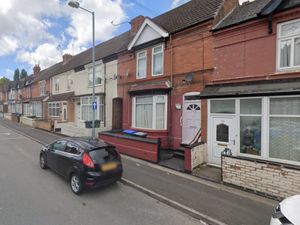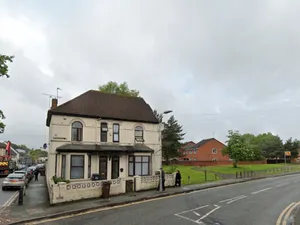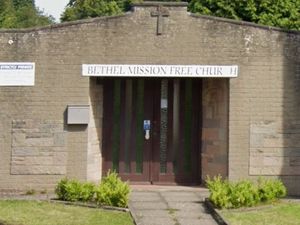Birmingham's Paradise development 'runs out of money' in aftermath of Carillion collapse
Birmingham's ambitious Paradise development has 'run out of money and needs £50m to continue' after initially hitting problems with the collapse of construction giant Carillion.
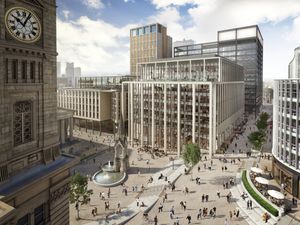
The city centre scheme has come under fire from city councillors after it was revealed they were kept in the dark while costs spiralled to the tune of £100m.
City councillors were told that overspends were inevitable but it was conceded there had been a significant breakdown in communication between builders, the city council and the Greater Birmingham and Solihull Local Enterprise Partnership (LEP).
The project is now in limbo with no budget currently available to deliver Phase 2.
But a Birmingham City Council audit committee was told on Tuesday it was still an ‘excellent scheme’ which would generate 10,000 new jobs and more than £300m worth of business rates when completed – far outweighing the growing costs.
Wolverhampton-based Carillion was working on the first office block, One Chamberlain Square, as well as infrastructure for the site as a whole.
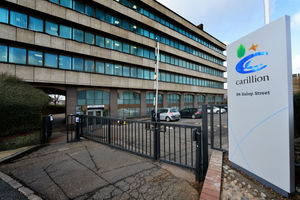
But the firm collapsed in January after a £850 million black hole in its finances was revealed.
Council leader Councillor Ian Ward admitted he only became aware of the situation with the Paradise development earlier this year.
He said: “When the decision [to approve initial funding] was taken it was recognised this was strategically important for the city. This remains the case today.
“What we have got to get right is the change in governance.
“The fact that there is a return to the LEP through business rates growth and return to the city council, does, I believe, mean we have to find a way of ensuring this development continues otherwise we will be left with a problem in that particular location for years to come.”
Talks are now ongoing with the LEP about finding the £50m.
The Paradise masterplan includes ten new office buildings, a hotel, public spaces and 550 car parking bays between Centenary Square and Victoria Square, as well as shops, restaurants and cafes.
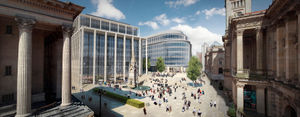
Previous landmarks such as the former central library and Fletchers Walk have been demolished to make way,
The development has been brought forward by the Paradise Circus Limited Partnership (PCLP) – a private/public joint venture with the council – and was valued at £700m initially thanks to significant investment from the private sector.
The council and LEP originally agreed to £87.8m worth of funding to pay for demolition and infrastructure works but not building construction.
The pot was to be split over three phases; £37.7m, £28m and £22.1m respectively.
But the first two sums were swallowed up by Phase 1 works alone which enabled the One Chamberlain Square and Two Chamberlain Square buildings with a combined 355,000 square foot of office space.
A major factor was that demolition and infrastructure works earmarked for later phases have been brought forward.
But an extra £29m was also racked up due to a number of reasons including the collapse of Carillion earlier this year and a massive inflation in construction costs.
It has left the overall scheme with a major cash-flow problem and money is now being sought from the LEP to deliver Phase 2 which includes the One Centenary Way, Three Chamberlain Square and new 4-star hotel buildings as well as Ratcliff Square.
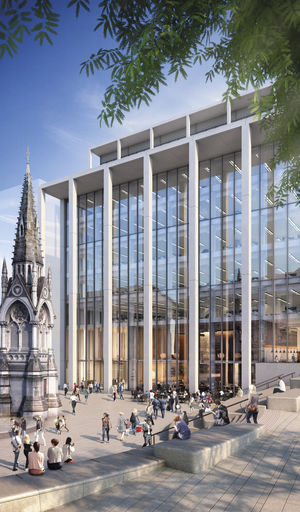
At this stage, no extra money is needed for Phase 3 which would deliver a number of office blocks surrounding Congreve Square, behind the One Chamberlain Square tower.
In light of the recent problems the LEP has assumed ‘governance’ of the scheme from the city council.
Committee members posed serious questions about the project as well as the fact that council bosses – save for two senior officers – were not informed of the increasing costs.
Councillor Lisa Trickett questioned how much of the extra business rates income the council would receive after the costs were covered.
She said: “When we actually balance all of the public subsidy and investment to the return to the citizens of this city over the next 20 years, where do we actually balance out?
“Have we done well or was this a development that should not have gone ahead?”
Councillor Suzanne Webb was the most vocal critic of the current situation describing the scheme as a ‘financial mess and risk to our city’.
She demanded answers as to why the Audit committee were not informed of the situation sooner adding: “It’s not okay to overspend. Alarm bells should have been ringing.”
Rob Groves, of Argent which is managing the development, offered some reassurance saying the private sector had paid the council hundreds of thousands of pounds to cover the cost of lost business rates during the entire construction period as well as the rental income from the former traders at Fletchers Walk.
While Clive Heaphy, the council’s director for finance and governance, argued that he only became aware of the issues with Paradise soon after joining the council in January at which point he informed Councillor Ward.
He confirmed a full audit report was being carried out around the decision-making within PCLP and communication with the council and LEP while outlining that a new governance structure had been put in place.
But Mr Heaphy stated that most of the cost increases ‘would have happened anyway’ regardless of whether the council knew about them.
He added: “It is an excellent site, with an excellent cost return ratio and excellent job creation,
“This is about the delivery of the project, the governance and communication.
“The scheme itself is still excellent and will go forward.”
Mr Heaphy also assured that the LEP were aware of the financial issues but remained ‘supportive’ of the Paradise development.
By Carl Jackson
Local Democracy Reporter

